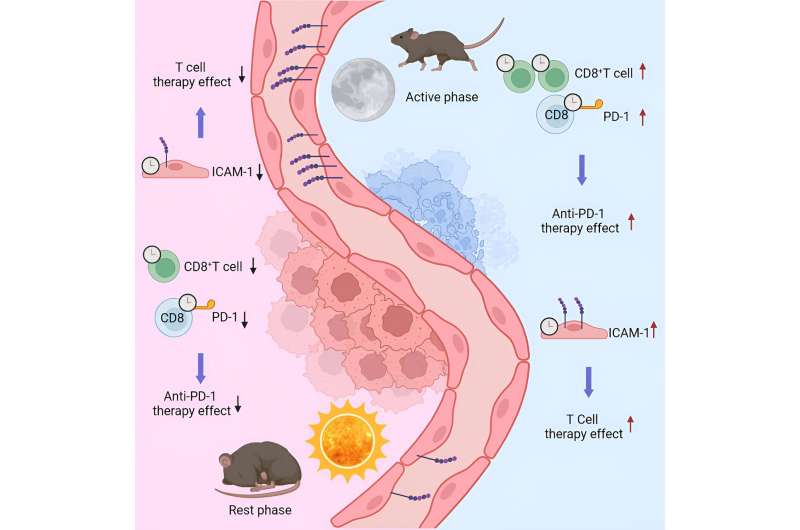This article has been reviewed according to Science X's editorial process and policies. Editors have highlighted the following attributes while ensuring the content's credibility:
fact-checked
peer-reviewed publication
trusted source
proofread
The importance of the rhythmicity of the immune system for tumor growth

By examining the immune modulations of tumors during the day, scientists from the University of Geneva and the LMU Munich are demonstrating their impact on the diagnosis and management of patients.
The currently most promising anti-tumor treatments are immunotherapies, which aim to boost the action of the patients' immune system to fight cancer. However, while these treatments are highly effective in some cases, their success is sometimes disappointing. How can this variability be explained?
In previous studies, a team from the University of Geneva (UNIGE) and Munich's Ludwig-Maximilian University (LMU) discovered the importance of the rhythmicity of the immune system for tumor growth. The same scientists have now demonstrated that the immune profile of tumors varies considerably depending on when during the day biopsies are performed.
These variations over time might lead to misdiagnosis and the prescription of inappropriate treatments. In addition, certain therapeutic targets previously neglected could prove key in the fight against the disease. These results, published in the journal Cell, could have major implications for the organization of clinical care and research into new drugs.
In 2022, the research team led by Christoph Scheiermann, full professor in the Department of Pathology and Immunology and at the Center for Inflammation Research at the UNIGE Faculty of Medicine and the University of Munich, observed an unexpected phenomenon: the growth and severity of tumors are linked to the circadian rhythm of immune cells. "But to use these results in a clinical context, we needed to understand their details in a model closer to reality," says Scheiermann.
To do so, the scientists injected a group of mice with melanoma tumor cells, then harvested the resulting tumor at different times of the day, two weeks later. Depending on the time of day, and therefore on the immune activation of the animal, the quantity of immune cells, but also the type of cells and their characteristics, varied considerably. This could have important implications in clinical settings.
"In hospital, patients undergo a biopsy to identify the tumor and its immune characteristics," explains Scheiermann. "Treatments, and in particular immunotherapies, are then decided on the basis of this examination. Now, depending on the time of the biopsy, the number of infiltrated immune cells may be very high—and the tumor classified as 'hot'—or very low ('cold'), even though it is the same tumor. Taking the biopsy at the wrong time can therefore lead to a wrong diagnosis."
A closer look at the timing of immunotherapies
To get as close as possible to clinical reality, the scientists administered two approved and widely used treatments to their groups of mice: CAR-T cells (that are custom-designed to recognize and target proteins specific to the tumor cells they will fight) and immune checkpoint blockades, which suppress the immune system's natural brakes in order to increase its activation against tumors.
"Administered at the wrong time, these treatments had no effect. At the right time, tumor burden could be significantly reduced," explains Scheiermann. "The number of immune cells present or not present in the tumor is a factor, but so are their characteristics and the resulting behavior."
Indeed, depending on the modulation of the molecular elements used to generate these treatments, the time at which they are administered becomes crucial. At the right time, the cells to be fought are immediately recognized. At the wrong time, the target molecules show lower expression, and the drug will have no effect.
Adapting schedules and treatments
These studies, carried out in mice, are corroborated by an examination of the survival rates of patients following immunotherapies. Morning treatment—at the peak of immune activation in humans—is systematically associated with a better survival rate. Studies are planned to assess the impact on patients of changing their examination and treatment times. Other projects will look at potential drug targets that have so far been underestimated.
In addition, these discoveries about immune rhythms have even wider implications: from the point of view of personalized medicine, on the one hand, to adapt therapeutic approaches to the temporal profile of patients (between 10% and 20% of people have a biological rhythm that is out of sync with the general population), and in the context of other pathologies, notably autoimmune diseases.
More information: Chen Wang et al, Circadian tumor infiltration and function of CD8+ T cells dictate immunotherapy efficacy, Cell (2024). DOI: 10.1016/j.cell.2024.04.015


















